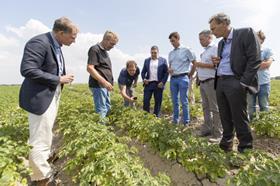
Dutch retailer Albert Heijn has signed a cooperation agreement with some of the Netherlands’ largest agricultural companies to enhance biodiversity around potato production in the country and boost the industry’s sustainability.
The group’s vice-president for produce, canned food, flowers and plants Said Belhassan was on hand to underline its commitment during a special signing ceremony in Oud-Beijerland, Zuid-Holland, joining representatives from leading potato companies Agrico, Leo de Kock and Nedato, and supported by consultancy firm CLM and Natuurmonumenten, a group that acquires and protects nature reserves.
The project will see Natuurmonumenten send special teams to help growers improve the natural environment by creating special grassy areas on the edges of their potato fields that increase the presence of wild flowers, birds and insects.
With CLM’s assistance, they will make what they hope are simple but effective improvements, including new plantings, nest boxes for birds of prey and owls, so-called bee-hotels and bat-boxes.
CLM said sowing the field edges with wild flowers was an important development in terms of creating a more natural farmland environment, not only because it increases biodiversity, but also because it improves water quality, stimulates population growth in birds, bees and butterflies, and makes the landscape more attractive.
In the provinces of Flevoland, Noord-Brabant, Zeeland and Zuid-Holland, 35 growers have already planted more than 20km of such field edges. The first of these are now apparently in bloom with fragrant herbs, grasses and summer flowers.
Belhassan commented: 'We are constantly looking for ways to make our potato cultivation sustainable through the use of resistant varieties and the use of fewer pesticides. In addition to these initiatives, our growers were looking for new ways to make an impact in the field of nature management.”
He added: “Thanks to the efforts of foresters and ecologists from Natuurmonumenten, they are contributing to a natural landscape. This joint involvement makes it possible to examine in a low-threshold way how a contribution is made to farmers, land and customers.”
Frans van Zijderveld, Natuurmonumenten’s provincial ambassador for Zeeland stated: 'We are pleased with the efforts of the growers. Nature goes beyond our nature reserves alone. It is therefore great that it is becoming increasingly obvious to take nature into account in business operations, and that we increasingly cooperate with our neighbours, in this case the potato growers. Because all animals help.'



